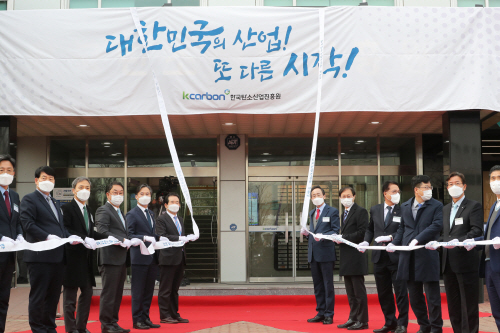
|
|
▲ Prime Minister Jeong Se-gyun (center left) attended the opening ceremony held at the Korea Carbon Industry Promotion Agency in Deokjin-gu, Jeonju on the afternoon of the 24th. |
[에너지경제신문 전지성 기자]The government has announced a plan to foster 1,600 carbon material convergence and composite companies by 2030. The goal is to create jobs for a total of 50,000 people, achieve annual sales of 50 trillion won and exports of 10 trillion won to become the’three major powerhouse in the carbon material fusion/convergence industry’.
The Ministry of Trade, Industry and Energy announced the’Comprehensive Development Strategy for Carbon Material Convergence and Convergence Industry’, which is a mid- to long-term roadmap with this content, at the opening ceremony of the Korea Carbon Industry Promotion Agency held in Deokjin-gu, Jeonju-si, Jeonbuk on the 24th.
Carbon materials are new materials made of carbon and are attracting attention that they will overcome the limitations of existing materials by possessing excellent physical properties (ultra-light weight, high strength, high conductivity, etc.).
The importance of the carbon material fusion/convergence industry, which produces parts and intermediate materials based on carbon materials and applies them to demand industries, contributes to maximizing product performance and creating added value, is also growing in importance.
The Ministry of Industry establishes ‘5 key demand industries-18 key areas’ that are expected to create synergy through the application of carbon materials, and supports customized policies for each demand industry.
First of all, it was decided to establish and establish a’Carbon Materials Convergence and Convergence Alliance’, a private-public consultation, to discover business models for each industry and create demand.
In addition, new markets will be created by establishing carbon clusters linked with regional specialized industries and support centers for each function. It is planning to strengthen its carbon fusion/composite capabilities in line with the five core demand industries, including carbon materials (Jeonbuk), precision machinery (Gyeongnam), semiconductors (Gyeonggi), display (Chungnam), and secondary batteries (Chungbuk).
It also prepares an institutional basis for fostering carbon specialized companies.
Through the’Parts Company Business Reorganization Support Group’, where government agencies, associations, and research institutes participate, we support existing parts and materials companies to expand and convert their business areas to carbon convergence projects.
Through this, the number of carbon convergence companies will increase from 778 last year to 1,400 in 2025 and 1,610 in 2030.
In addition, to expand the market, 300 projects of demand industry demonstration projects will be promoted by 2030. Full-cycle corporate support based on commercialization such as empirical support for demanded items, preparation of the basis for commercialization, mass production and reliability evaluation, and prototype certification is provided.
In order to create a new market, it plans to grow 200’Tantan Companies’ and 100’C-Startups’, which are specialized companies that have secured their own technology in the field of carbon materials, parts molding and manufacturing.
In addition, 30 billion won will be invested annually in research and development (R&D), standardization and demonstration projects by 2030 in order to secure cutting-edge technology for major carbon fusion/combination promising items.
The Ministry of Industry proposed a goal to increase the global market share of carbon materials from 3% to 15% last year by 2030 by enhancing the price competitiveness of carbon materials and parts.
In addition, it is a policy to increase industrial competitiveness by securing the original technology of carbon materials and parts and by equipping 20 technologies for manufacturing and molding equipment.
